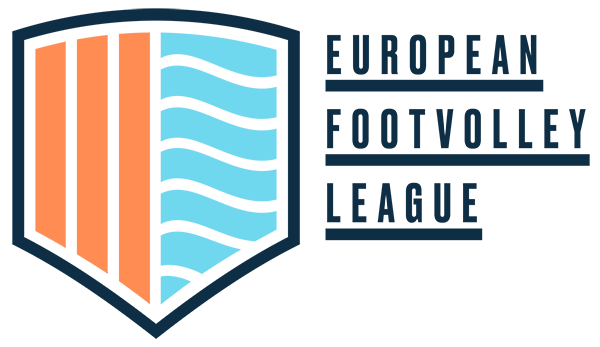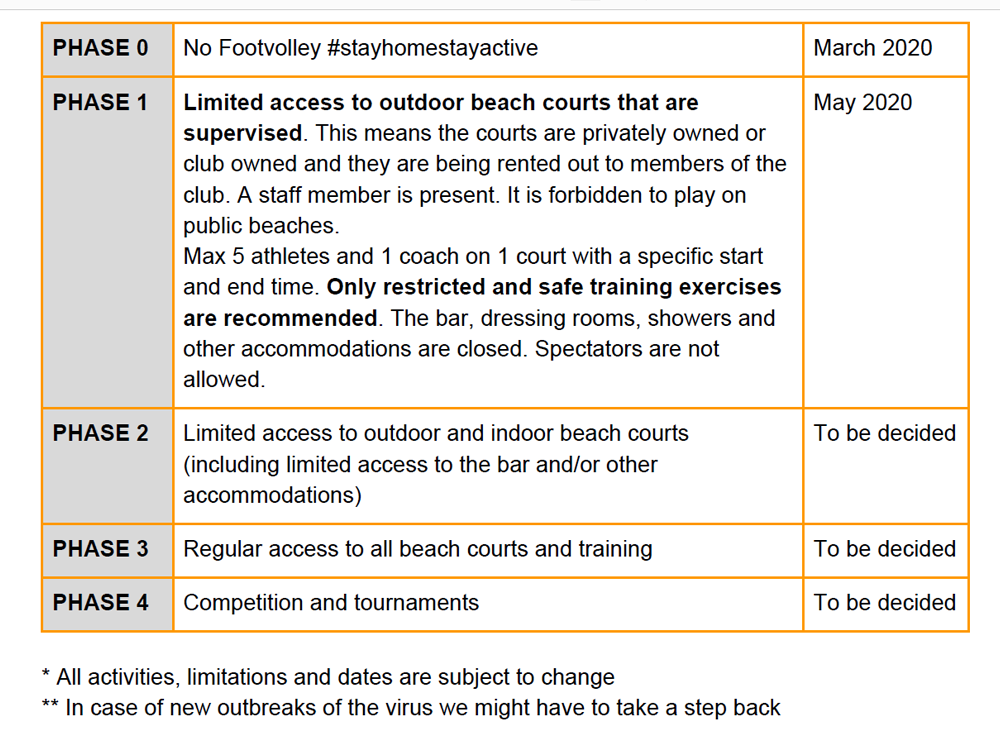Footvolley Covid-19 protocol
In several countries the authorities are easing some of the Covid-19 lockdown measures. Slowly people will be allowed to return to a limited form of sport activities. Does this mean we can play footvolley again? And if so, how can we do it responsibly? The Footvolley Covid-19 Protocol provides recommendations for athletes, coaches and organisers.
DOWNLOAD PROTOCOL (0.5 MB PDF of all guidelines as described in this article)
DOWNLOAD POSTER (9 MB PDF of poster with basic information to print)
This protocol is partly based on the guidelines of national volleyball and football federations in several of our member nations. Keep in mind that the official laws and regulations in your country and region have priority over this protocol Furthermore we don’t make any medical claims. We just want to inform the footvolley community and raise awareness. Playing footvolley, like most other sports activities, is not without risk, even when strictly following these guidelines. Be careful, play safe.
General planning 2020-2021
This protocol was written early May 2020 during the novel coronavirus (Covid-19) pandemic. Last update 8 May 2020. At this time several countries are preparing to start up footvolley and other sports activities at different speeds. For example: The national laws and guidelines for sports in Sweden are very different from the one’s in Spain or the UK at the moment. In the Netherlands only children and youth under 18 are allowed to train in the sand. In Germany, they don’t allow headers for recreational football players.
In the absence of extensive Covid-19 testing this protocol is to be considered as a general recommendation to prevent the spread of the virus. We distinguish 4 start-up phases:
General guidelines of phase 1
In general the safety guidelines include::
Limit the playing opportunities: Only provide / rent out beach courts for training sessions (reservations online or by phone). Tournaments and events are not allowed
Register start and end times: If you rent out a beach court make sure to clearly define start and end times. Reservations should be made online or by phone. No cash payments. Announce these times and the exact location of the court beforehand. This will reduce the moments of contact for the athletes at the sports location
Reduce the number of participants: It’s recommended to allow a maximum of 6 persons (5 athletes and 1 coach) on one beach court. In some countries they only allow children under 18 to start training again in the month of May. It’s recommended to always train with the same people in order to keep your contact bubble small
Own court: Athletes will stay on their own court. Coaches and staff can move between courts. But they can only give instructions for one court with respect to the 1.5 meter distance rule
Supervision is required: There should be a supervisor / staff member present at the sports location, especially when training with children. This is the obligation of the owner / organiser of the location
Limitations for exercises: Coaches and athletes always need to consider the distance, safety and hygiene rules before, during and after training exercises. All member nations will collect and share recommended ‘corona-safe’ footvolley exercises. It’s recommended to avoid attacking very close to the net and to avoid heading an unhygienic ball
Disinfect the balls: Provide maximum hygiene measures. When possible only use the balls of the accommodation / club. The balls need to be disinfected before and after each time slot / training session. Only staff members should level and clean the sand on the courts. Only staff members should install the net and the poles and adjust the height of the net. Athletes should never touch the poles and the net. Make a schedule to follow-up on these hygiene measures
Communication: Provide posters with these new guidelines and put them at the entrance and next to the fields of the sports location
Compliance: One staff member of each sports location is responsible to supervise these guidelines and should be present at all times
Safety and hygiene rules for everybody
EFVL advises to strictly follow the measures below:
Always use your common sense. Be alert to your surroundings. Communicate
Do not participate in group sport activities if you are at risk to develop severe symptoms of Covid-19 because of poor health and other underlying conditions
Stay at home when you have any of the following (even mild) symptoms: nose cold, coughing, shortness of breath or fever
Stay at home when someone in your household or that you came close to had a fever (38 C°or more) and/or had shortness of breath in the past 7 days
Stay at home when someone in your household or that you came close to tested positive for the new coronavirus (Covid-19). If you are infected it might take up to two weeks after the last contact before you become sick. So you have to stay at home for 14 days after the last contact with a confirmed case.
If you are diagnosed with Covid-19 yourself, please consult a doctor/physician before starting to sport again. You can infect others up to 1 month after being sick
Always keep 1.5 meter distance (two arm lengths) from everybody who is not from your household
Cough and sneeze in your elbow and use paper tissues
Go to the toilet before you leave your home to sport
Wash your hands with water and soap at home for at least 20 seconds
Wash your hands with water and soap before and after visiting the sports location
Shower at home, not at the sports location
Do not touch your face
Do not shake hands
Do not arrive earlier then 10 minutes before and return home immediately after the sports activity
Additional safety and hygiene rules for athletes
EFVL advises to strictly follow the measures below:
Register in time for the sports activity (by phone or online) or follow the rules of the city / organiser. No cash payments. Make sure the organiser can manage the number of people showing up at the same time. No unannounced guests
Only show up at the sports location when you have an activity planned
Travel alone or with a member of your household
Put on your sports outfit before you leave from home. Dressing rooms and showers will be closed. Use the toilet at home
Do not arrive earlier than 10 minutes before the sports activity and wait at the designated spot before it starts. Always stay on your own court
Always follow the instructions of the organiser (staff members and coaches)
Athletes should always keep 1.5 meter distance (two arm lengths) from everybody who is not of your household. This includes staff, coaches and other athletes. Children under 12 can be excluded from this distance rule
When possible use materials and balls provided by the organiser / club. Organisers are obligated to disinfect the materials and balls before and after each training session
If possible, play with (newly developed) sports masks
Avoid contact with the net and poles at all times. Be careful while practising attack forms at the net
Avoid heading an unhygienic ball. According to the latest findings sweat does not transmit Covid-19. But there is always a possibility the surface of a ball contains the virus. To play it safe the ball should not touch your face. Unless it is a clean ball that nobody else touched, except a coach with clean hands throwing it. Be strict about the clean hands / clean materials policy before the exercise / training. Playing 2 vs 2 games over the net increases the risk because several people will touch the ball in an uncontrolled manner. Consider only using your shoulder, chest and everything below. You can still do shark attacks, but no shark blocks
Avoid exercises where it is unclear who will receive the ball (like serving in the middle) to avoid collision between players. Communicate
Wash your hands and forehead with water and soap in between exercises and in time-outs if possible. Bring your own towel
Bring your own drinking bottle and label it
Return home immediately after the activity
Additional safety and hygiene rules for staff, coaches and volunteers
EFVL advises to strictly follow the measures below:
If possible; travel alone (or with members of your household) to the sports location
Prepare your training session thoroughly. Respect the distance rule (1.5 meter) in all exercises. Avoid sharing materials when possible. Start easy and safe to let the people get used to the new situation
Do not mix up different groups on different beach courts. Keep the contact bubble small
Prepare the court before the session so you can start in time when the athletes enter the field
Designate specific areas / courts to specific groups
Before you start:
Explain the distance rules and hand hygiene rules
Check if they or the people they came close to did not experience symptoms or were recently diagnosed with Covid-19
Point out that hand shakes are forbidden
During the session:
Watch closely that all rules are followed
If not, speak up and communicate the rules again
Make sure to keep your own distance from athletes and other coaches / staff members. Physical contact is not allowed
If possible, play with (newly developed) sports masks
Avoid contact with the net and poles at all times. Be careful while practising attack forms at the net. Do not allow blocking. Keep a safe distance
Avoid exercises where it is unclear who will receive the ball (like serving or throwing a ball in the middle) to avoid collision between players
Avoid heading an unhygienic ball. According to the latest findings sweat does not transmit Covid-19. But there is always a possibility the surface of a ball contains the virus. To play it safe the ball should not touch your face. Unless it is a clean ball that nobody else touched, except a coach with clean hands throwing it. Be strict about the clean hands / clean materials policy before the exercise / training. Playing 2 vs 2 games over the net increases the risk because several people will touch the ball in an uncontrolled manner. Consider only using your shoulder, chest and everything below. Shark attacks are allowed, but no shark blocks
Know who is participating in the session, members and non-members; Make a list
Follow the instructions on how to use and clean the materials and balls
Do not allow athletes onto the court earlier than 10 minutes before the starting time
When working with larger groups avoid that everyone arrives and leaves at the same time
Do not allow spectators near the courts unless it’s necessary to help out
Cough and sneeze in your elbow and use paper tissues
Bring your own drinking bottle and label it. Bring your own towel
Wash or disinfect your hands and forehead after each session and, if possible in between exercises or during time-outs
Make sure everyone returns home immediately after the session
The EFVL member nations will evaluate this protocol and provide updates. We encourage all footvolley lovers to share their experience and insights. Feedback is always welcome. We understand these guidelines are strict and take away some fun of playing. But for now it is better to be safe than sorry. #unitedwecare #unitedweplay


